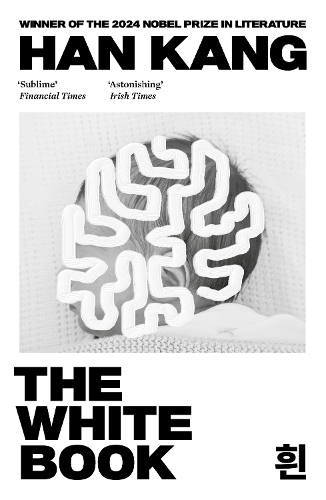
The White Book
(Paperback)
Publishing Details
The White Book
By (Author) Han Kang
Translated by Deborah Smith
Translated by Deborah Smith
Granta Books
Granta Books
25th July 2018
5th April 2018
United Kingdom
Classifications
General
Fiction
Poetry / Poems
306.4
Long-listed for Wellcome Trust Book Prize 2018 (UK)
Physical Properties
Paperback
128
Width 131mm, Height 198mm, Spine 13mm
250g
Description
From the author of The Vegetarian and Human Acts comes a book like no other. The White Book is a meditation on colour, beginning with a list of white things. It is a book about mourning, rebirth and the tenacity of the human spirit. It is a stunning investigation of the fragility, beauty and strangeness of life.
Translated from the Korean by Deborah Smith.
Reviews
A brilliant psychogeography of grief, moving as it does between place, history and memory... Poised and never flinches from serene dignity... The White Book is a mysterious text, perhaps in part a secular prayer book... Translated seamlessly by Smith, The White Book succeeds in reflecting Han's urgent desire to transcend pain with language -- Deborah Levy * Guardian *
Wonderful. A quietly gripping contemplation on life, death and the existential impact of those who have gone before -- Eimear McBride
The White Book is a profound and precious thing, its language achingly intimate, each image haunting and true. It is a remarkable achievement. Han Kang is a genius -- Lisa McInerney
There is beauty and pain in every sentence and image, made sharper by their simplicity and aching honesty * New Internationalist *
Each [chapter] is a miniature work of art in its own right... there is a crispness to [Han's] pieces evocative of the stark luminescence of white... This is a book you want to underline and highlight every other line or word as you read, yet every time I went to make my mark, my pencil hovered over the margins - deep as drifts of pillow-white snow - as I remained reticent to taint the perfect whiteness in front of me. The White Book is a shimmering, evocative work. Smith's peerless translation captures every last tiny nuance, the resultant prose so beautiful and affecting that it stops you in your tracks -- Lucy Scholes * National UAE *
A fragile work of literature * Live Mint *
Delicate and thoughtful and concise and dense and strong; this is the kind of writing I like to read slowly -- Jon McGregor * Guardian *
An astonishingly rendered work of fiction... Precise, subversive, fierce and deceptively opaque... A sublime expression of grief's incongruous byways, its busy inactivity, its larger, more elaborate intrusions -- Catherine Taylor * Financial Times *
[Han] in her new work transgresses literary convention and examines the constellation of pain at the heart of her mother's first pregnancy... Shot through with pain and paradox [...] Kang transforms obliteration into promise. Loss and living are counterpointed, neither meaning revoked -- Katherine Waters * Arts Desk *
[An] astonishing novel... with such tenderness [that] incites us to examine our own experience and place in the world... It's a profound piece of work [...] that is as much concerned with what is unsaid and omitted, as what is revealed... Han's painful, exquisite story is a philosophical lament for all the shades of life -- Sinead Gleeson * Irish Times *
Incantatory... The White Book reveals Han to be an innovative author committed to formal experimentation... Intensely personal, hypnotically serene, and mournfully meditative, Han's thanatopsis reminds readers of the revivifying power of memory and the extent to which we are uniquely endowed within the natural world to withstand the vagaries of forgetfulness and life's nagging ephemerality -- Brian Haman * Asian Review of Books *
An intensely emotional series of accounts that form an outline of losses which are invisible, but still palpably felt -- Eric Anderson * Lonesome Reader *
Evocative and beautifully laconic, this book is about belonging, grief and the sensory experience of being alive * Book Riot *
A brilliant psychogeography -- Deborah Levy
A tender evocation of grief and absence... Han Kang is a real artist * Irish Times *
Formally daring, emotionally devastating and deeply political -- Katie Kitamura * International New York Times *
Author Bio
Han Kang was born in Gwangju, South Korea, and moved to Seoul at the age of ten. She studied Korean literature at Yonsei University. Her writing has won the Yi Sang Literary Prize, the Today's Young Artist Award, and the Korean Literature Novel Award. The Vegetarian, her first novel to be translated into English, was published by Portobello Books in 2015 and won the 2016 Man Booker International Prize. She is also the author of Human Acts (Portobello, 2016) and The White Book (Portobello, 2017). She is based in Seoul.
Deborah Smith's translations from the Korean include two novels by Han Kang, The Vegetarian and Human Acts, and two by Bae Suah, A Greater Music and Recitation. In 2015 Deborah completed a PhD at SOAS on contemporary Korean literature and founded Tilted Axis Press. In 2016 she won the Arts Foundation Award for Literary Translation. She tweets as @londonkoreanist.
